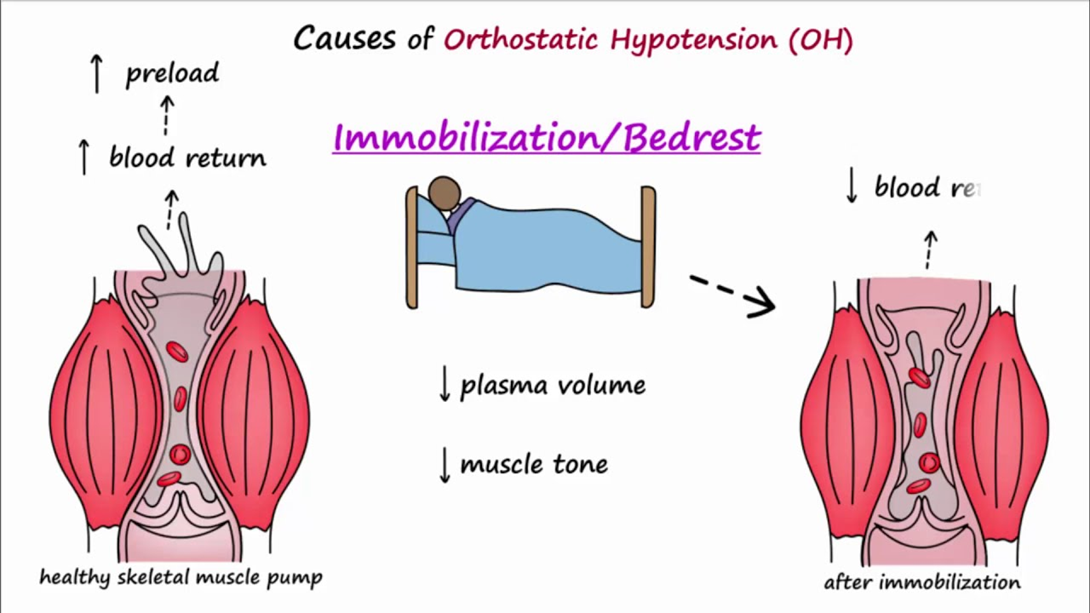Which intervention is appropriate to include in the plan of care for a patient with Parkinson's disease?
Soft diet with thin liquids
Assess for orthostatic hypotension
Check for exophthalmos
Limit fluids to prevent urinary incontinence
The Correct Answer is B
Choice A reason: A soft diet with thin liquids may be recommended for patients with Parkinson's disease who have difficulty swallowing (dysphagia), but it is not the most appropriate intervention for all patients. Dysphagia is common in Parkinson's disease due to impaired muscle movement, and a soft diet can help prevent choking and aspiration.
Choice B reason: Assessing for orthostatic hypotension is crucial in the care of patients with Parkinson's disease. Orthostatic hypotension is a common non-motor symptom where there is a significant drop in blood pressure upon standing. Normal blood pressure should not drop more than 20 mm Hg systolic or 10 mm Hg diastolic within 2 to 5 minutes of standing². This condition can increase the risk of falls, which is a significant concern in this population.
Choice C reason: Exophthalmos, the bulging of the eyes, is not associated with Parkinson's disease. It is typically related to thyroid eye disease, such as Graves' disease, and would not be a relevant assessment for a Parkinson's patient unless there is a known co-existing thyroid condition.
Choice D reason: Limiting fluids to prevent urinary incontinence is not an appropriate intervention for Parkinson's disease. Adequate hydration is essential, and urinary incontinence should be managed with other strategies, such as bladder training, scheduled toileting, and possibly medication, depending on the cause.

Nursing Test Bank
Naxlex Comprehensive Predictor Exams
Related Questions
Correct Answer is D
Explanation
Choice A reason: A temperature of 99.6°F is a mild fever and not specifically indicative of the late phase of septic shock.
Choice B reason: Skin that is flushed with a capillary refill of less than 3 seconds does not suggest the late phase of septic shock, which would typically present with poor perfusion.
Choice C reason: A renal output of 45 mL/hr is within the normal range (0.5-1 mL/kg/hr for adults) and does not necessarily indicate the late phase of septic shock.
Choice D reason: Arrhythmias can be a sign of the late phase of septic shock as they indicate cardiac dysfunction, which is a result of decreased tissue perfusion and can lead to multiple organ failure.
Correct Answer is B
Explanation
Choice A reason: While individuals with rheumatoid arthritis may have an increased risk of infection due to the disease itself or the use of immunosuppressive medications, it does not pose as high a risk as intravenous lines for sepsis.
Choice B reason: A peripherally inserted central catheter (PICC) line, especially when used for total parenteral nutrition (TPN), presents a significant risk for infection due to the direct access to the bloodstream, making this client at the highest risk for sepsis.
Choice C reason: Asthma and bronchitis can lead to respiratory infections, but these conditions do not typically result in sepsis unless the infection becomes severe and systemic.
Choice D reason: Renal calculi (kidney stones) can cause infections; however, they are less likely to lead to sepsis compared to a central line.
Whether you are a student looking to ace your exams or a practicing nurse seeking to enhance your expertise , our nursing education contents will empower you with the confidence and competence to make a difference in the lives of patients and become a respected leader in the healthcare field.
Visit Naxlex, invest in your future and unlock endless possibilities with our unparalleled nursing education contents today
Report Wrong Answer on the Current Question
Do you disagree with the answer? If yes, what is your expected answer? Explain.
Kindly be descriptive with the issue you are facing.
